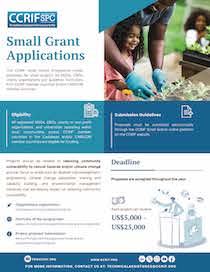
Grand Cayman, Cayman Islands, June 2, 2020. CCRIF is pleased to announce that its member governments in the Caribbean have all renewed their parametric insurance coverage for tropical cyclone, excess rainfall, earthquake and fisheries ahead of the upcoming 2020 Atlantic Hurricane Season, ceding over US$1 billion in risk to CCRIF and increasing overall coverage by 8 per cent. To support Caribbean governments whose social and economic sectors have been significantly disrupted by COVID-19, the European Union (EU) under its Global COVID-19 Response, has provided a grant of €10 million (US$11 million) to CCRIF for premium support or for increasing coverage for its Caribbean members. This financial assistance to CCRIF is channelled through the EU Regional Resilience Building Facility managed by the Global Facility for Disaster Reduction and Recovery (GFDRR) and The World Bank. The GFDRR, the World Bank and CCRIF will continue efforts to secure further potential discounts to CCRIF member countries.
The renewal of countries’ catastrophe risk insurance policies at this time signals the strategic importance they are placing on disaster risk financing as key to advancing their sustainable development prospects and they welcome this additional support provided to them by the EU in the context of shrinking fiscal space.
The EU-funded support that is available for each member country would provide at least a 26 per cent (26%) discount on total gross premium or an increase in policy coverage under their CCRIF parametric insurance policies. This is in addition to the discounts that CCRIF also is providing - 5 per cent discount on gross premium for Tropical Cyclone coverage, and a further discount of 15 per cent on additional coverage purchased by members for increased Tropical Cyclone and/or Earthquake coverage for the 2020/21 policy year.
Daniela Tramacere, EU Ambassador to Barbados, the Eastern Caribbean States, OECS and CARICOM/CARIFORUM, has reaffirmed the strong partnership with the Caribbean in these difficult times: “Mitigation of COVID-19 impacts ahead of the hurricane season that already started in the region requires extraordinary and coordinated measures. EU is strongly committed to stand together with its partners in the Caribbean, providing emergency support and participating in the social/economic recovery process. The €10 million support has been provided to CCRIF SPC to ease payment of member countries’ premiums and improve their risk coverage against natural hazards.”
Member countries have the option of utilizing the EU-funded discount during the 2020/21 and 2021/22 policy years. The decision to allow for use of the funding in 2021/22 is based on projections of low or negative growth in Caribbean countries next year, which undoubtedly will have an impact on their fiscal space.
While CCRIF, over the years has received financial support from as many as 12 bilateral and multilateral development partners, this is the first time that support is being provided to all members simultaneously en bloc for premium support. The EU has been one of CCRIF’s development partners from its inception in 2007 having contributed to a Multi-Donor Trust Fund (MDTF) that enabled the initial capitalization of CCRIF. Again in 2014, the EU contributed to the capitalization and development of new parametric insurance products for current and potential members of CCRIF, and to facilitate the entry of Central American countries and additional Caribbean countries to join the Facility.
CCRIF CEO, Isaac Anthony commented, “I must use this medium to openly thank the European Union for its rapid response in support of our member countries at a time when they are grappling with significantly diminished financial resources due to the economic crisis posed by COVID-19. I also take the opportunity to thank the GFDRR and the World Bank for facilitating this timely assistance to Caribbean countries as part of their wider response to the COVID-19 crisis in the region”.
Since its inception in 2007, CCRIF has made 41 payouts totalling US$152 million to 13 of its 22 member governments on their tropical cyclone, earthquake and/or excess rainfall policies – all within 14 days of the event. For example, following Hurricanes Irma and Maria in 2017, CCRIF made payouts totalling US$55 million to 9 affected Caribbean countries. The single largest payout made by the Facility was US$20.4 million to the Government of Haiti on its Tropical Cyclone policy following TC Matthew in 2016; and following Hurricane Dorian in The Bahamas last year, the Facility made two payouts to the Government totalling US$12.8 million. CCRIF is working to bring new parametric insurance products to market for drought, the agriculture sector and public utilities with support from our donor community. CCRIF limits the financial impact of natural hazard events to Caribbean and Central American governments by quickly providing short-term liquidity when a policy is triggered.
As the 2020 Atlantic Hurricane Season begins, Caribbean countries are assured that they are covered for another year – against tropical cyclones as well as excess rainfall events that occur throughout the year and earthquakes that may occur at any time. There is scientific consensus on an above-average Atlantic Hurricane Season this year. The National Oceanic and Atmosphere Administration (NOAA) is forecasting a likely range of 13 to 19 named storms (with winds of 39 mph or higher), of which 6 to 10 could become hurricanes (with winds of 74 mph or higher), including 3 to 6 major hurricanes (category 3, 4 or 5; with winds of 111 mph or higher).
CCRIF also has three members in Central America that have coverage for tropical cyclone, earthquake and excess rainfall. The Facility is a working example of a disaster risk financing instrument and one of a suite of such instruments available to governments to assist in post-disaster recovery and to help close the protection gap.
According to Mr. Anthony, “The truth is what we do at CCRIF is about supporting governments to help their populations – communities, businesses and key sectors such as education, agriculture,and tourism. An assessment of the beneficiaries of CCRIF’s payouts show that over 2.5 million persons in the Caribbean and Central America have benefitted directly and/or indirectly from these payouts after a natural disaster”.
About CCRIF SPC: CCRIF SPC is a segregated portfolio company, owned, operated and registered in the Caribbean. It limits the financial impact of catastrophic hurricanes, earthquakes and excess rainfall events to Caribbean and Central American governments by quickly providing short-term liquidity when a parametric insurance policy is triggered. It is the world’s first regional fund utilising parametric insurance, giving member governments the unique opportunity to purchase earthquake, hurricane and excess rainfall catastrophe coverage with lowest-possible pricing. CCRIF was developed under the technical leadership of the World Bank and with a grant from the Government of Japan. It was capitalized through contributions to a Multi-Donor Trust Fund (MDTF) by the Government of Canada, the European Union, the World Bank, the governments of the UK and France, the Caribbean Development Bank and the governments of Ireland and Bermuda, as well as through membership fees paid by participating governments. In 2014, an MDTF was established by the World Bank to support the development of CCRIF SPC’s new products for current and potential members, and facilitate the entry for Central American countries and additional Caribbean countries. The MDTF currently channels funds from various donors, including: Canada, through Global Affairs Canada; the United States, through the Department of the Treasury; the European Union, through the European Commission, and Germany, through the Federal Ministry for Economic Cooperation and Development and KfW. In 2017, the Caribbean Development Bank, with resources provided by Mexico, approved a grant to CCRIF SPC to provide enhanced insurance coverage to the Bank’s Borrowing Member Countries and in 2018, the Government of Ireland also provided support to CCRIF.





